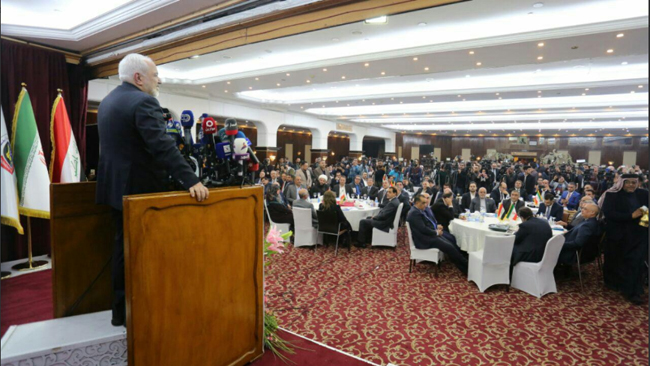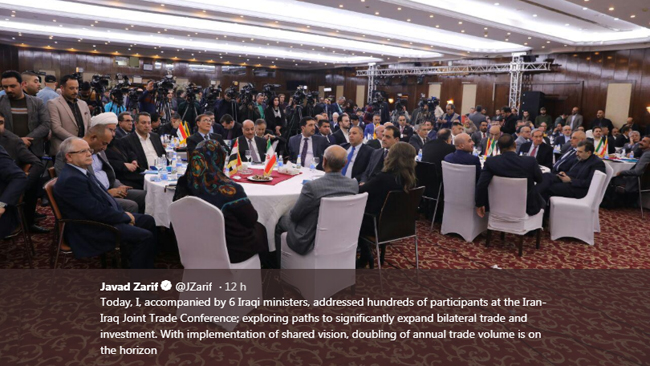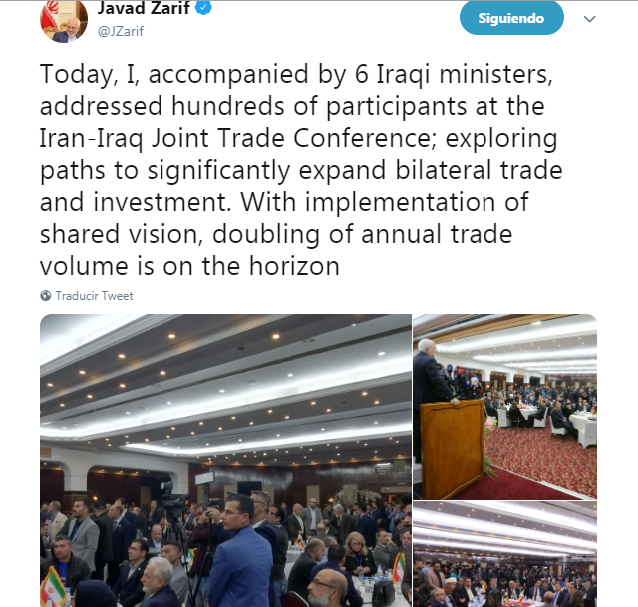Iran says it’s prepared to end visa regime for all Iraqi citizens and lower tariffs in a bid to further stimulate the bilateral trade that currently stands at 12 billion dollars annually.
“We are ready to end visa for Iraqis or start electronic visa regime from today,” stressed Iran Foreign Minsiter, Mohammad Javad Zarif, who is on a 5-day working visit to the neighbouring country leading big political and trade delegations. He was speaking at the Iran-Iraq Joint Trade Conference in the Iraqi capital Baghdad on Monday.
He announced Tehran’s readiness to take the action after Jaafar Al-Hamdani, President of the General Union of Iraqi Chambers of Commerce complained that many Iraqi businessmen are barred from “some countries” if they travel to Iran. He was referring to the US that has prohibited entry to some people who have or had previously visited Iran. Javier Solana, ex-EU’s foreign policy chief was the highest profile person who was denied US entry last year because of his visit to Iran in 2013 to attend President Hassan Rouhani’s inauguration.
Currently, Iraqi tourists who wish to visit the Iranian island of Kish in the Persina Gulf are exempt from applying for a visa if they enter from Abadan’s Free Trade Zone on the border with Iraq.

A screenshot of Iran FM Zarif's tweet showing him addressing Iranian and Iraqi businessmen in Baghdad
Last year, Iraqis topped the list of foreign tourists that visited Iran. Three million Iraqis visited the country in 2017, that is 75% of all foreign tourists, according to Hassan Danaifar, secretary of the committee to develop Iran’s economic relations with Iraq and Syria. Many Iraqis are medical tourists who flock to the country to seek medical help as Iran has made huge advances in medicine in recent years.
The Iranian Foreign Minister also said Tehran is ready to reduce the import tariffs for Iraqi “brothers” to zero, emphasising that Iran doesn’t see any “ceiling” in relations with the neighbouring Arab country.
Iran stood behind the Iraqi governments since the US invasion in 2003 and later during the creation of the so-called Islamic States, pockets of which are still active in some parts of the country.
“You and us have experienced war and cruel sanctions and economic pressures. But, we together can lay the foundations of a strong region in which bilateral relations are stronger than ties with foreign countries,” Zarif told the forum in Iraq.

A screenshot of Iraqi and Iranian businessmen attending joint Iran-Iraq business forum in Baghdad (Photo: Iran FM Zarif's tweet)
Iraq launched an eight-year war under Saddam Hussein against Iran at the turn of the 1980s. However, Iran has decided to turn a page on relations with its small neighbour and aid the country and help it defeat the terrorists.
On the commercial side, Iranian products have been dominating the Iraqi market. "We exported 6.4 billion dollars worth of commodities to Iraq last year," said Danaifar, expressing hope the exports rise 35% to hit 8 billion dollars by the end of the current Persian year (21 March).
Iranian exports to its neighbour rose 40% during the first nine months of the current Persian year (April-December 2018), he told a forum between the government and the private sector in Iran’s western Kurdistan province on the border with Iraq last week.
Also, data released by the National Agriculture and Water Strategic Research Center of Iran’s Chamber of Commerce last December showed that Iraq topped the target market of Iranian agriculture and food exports such as fruit, vegetable, milk and other dairy products, saffron and fish. “More than 40% of the Iranian exports made their way to Iraq during the last eight months of the current Persian year (April-November 2018),” read the report.
The Iranian policy chief believes if all agreements are implemented, Iran and Iraq can double their trade volume.

A screenshot of a Zarif's tweet following his attendace at the Iran-Iraq Joint Trade Conference in Baghdad
Zarif said his country is ready to create five free trade zones on its border with Iraq. For his part, Mohammad Reza Ansari, Vice President of Iran Chamber of Commerce, Industries, Mines and Agriculture (ICCIMA) who is leading the business delegation, said the Iranian private sector is prepared to implement all the agreements and take more efforts to further increase bilateral Iran-Iraq trade.
He stressed "thousands of years of friendship and co-existence" with Iraq, saying some 40 Iranian firms are involved in reconstructing Iraq worth some 2 billion dollars.